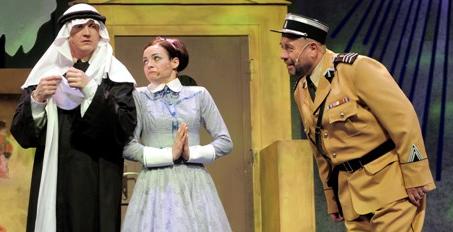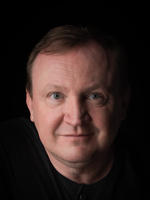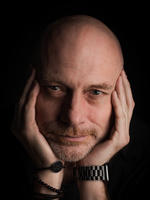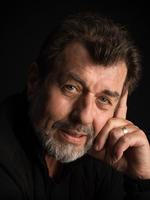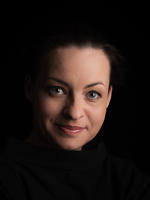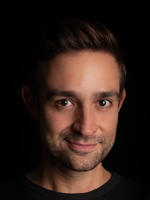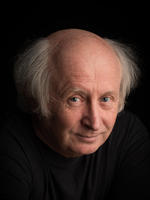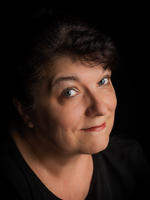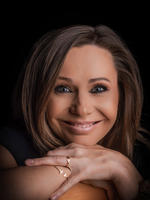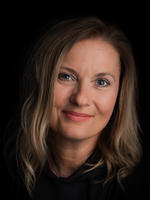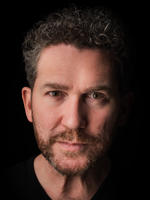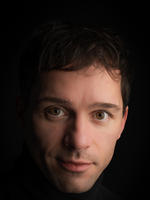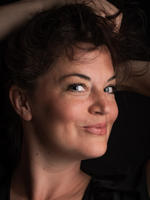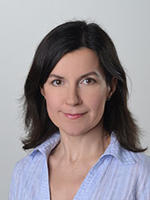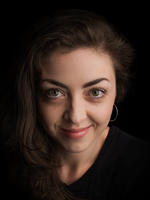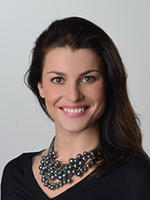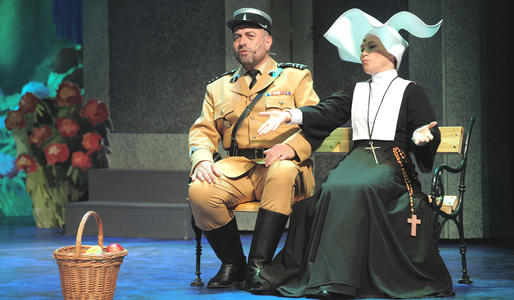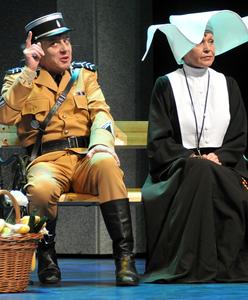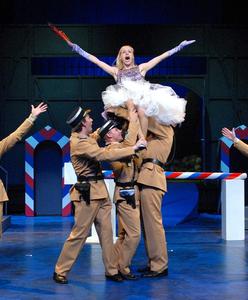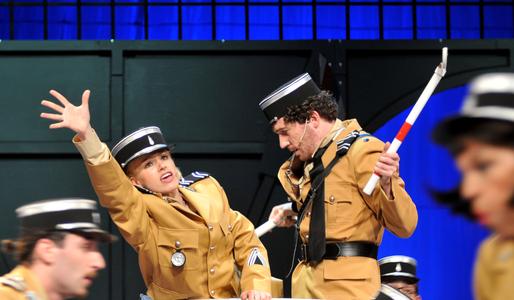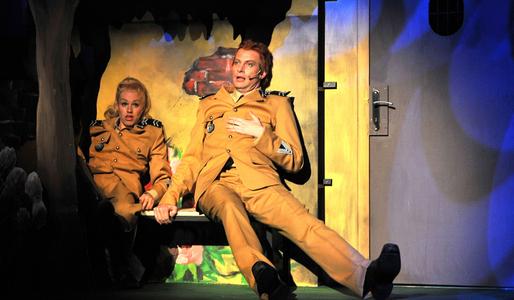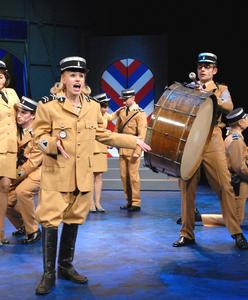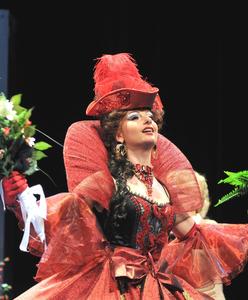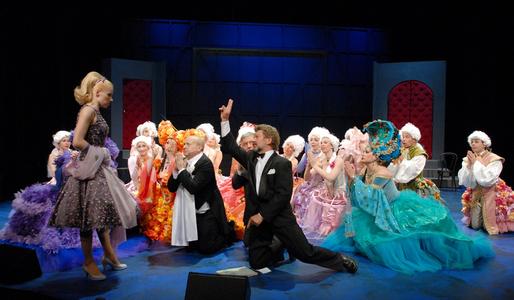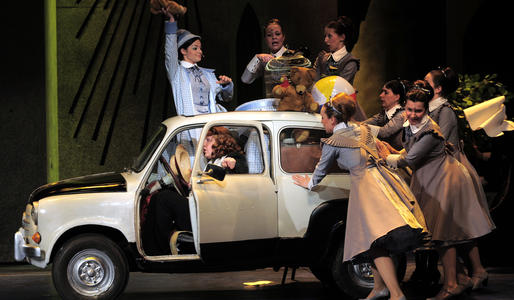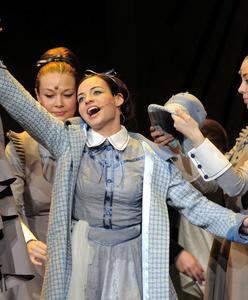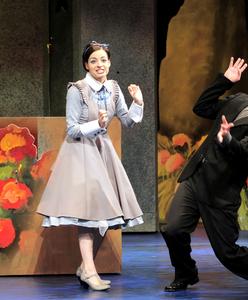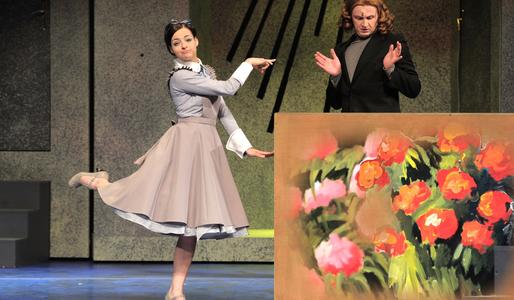The operetta hasn't disappeared - luckily, musicals haven't destroyed it
Tomáš Hejzlar 13. December 2008 zdroj Haló noviny
Here's to the new Brno production of Hervé's operetta Mam’zelle Nitouche!
Miss Goody is still celebrating
The present new production of the famous operetta Mam’zelle Nitouche - in the Czech translation Miss Goody-goody or also Miss Touch-Me-Not - is an example of the unique production efforts of Brno City Theatre. The full-length performance, which was composed by Hervé - whose real name was Florimond Ronger- using a libretto by Albert Millaud and Henri Meilhac, ranks among the best that international operetta repertoire has to offer. And it is attractive not only for Brno spectators. The operetta, with its many-meanings of its content and sometimes perhaps somewhat allegorical bipolarity (well: which title doesn't have a double meaning in a political environment, at least latently), points at the faults of its time, which are topical these days as well, in an inventive way. The chameleon-like morality of the central character, i.e. Célestin - Floridor in the operetta form are similarly as "strange" as the behaviour of many contemporary politicians.
The present Brno production is based on the traditional principles of the operetta form but it doesn't take the production of an operetta only as a summary of archetypal features. The operetta cliché which often accompanies this title, and not only on our domestic stages, changes here into a wittily-staged piece which respects the traditions of the operetta genre but doesn't just churn them out without a thought. The experienced director Gustav Skála can come close to the mentality of the 21st century spectator in the stage production, which he created in cooperation with Ondřej Šrámek, without taking anything away from the operetta style, like the unforgettable comic (and similarly inventive director, theatre principal etc.) Oldřich Nový did exactly seventy years ago, and whose adaptation is used as a source for Brno's adaptation today.
Yes, it was Nový, who in the past also played Lieutenant Champlatreux and subsequently the famous main double role Célestin - Floridor, who modernised Hervé's vaudeville politically in the year of the signing of the infamous Munich pact (1938) - as if to predict the long years during which two-facedness played a very important and simultaneously very dangerous role in our homeland. The new production gained a spontaneously positive reaction from the audience in response to his well-proven translation and adaptation.
"The production Mam’zelle Nitouche at Brno City Theatre includes innovations and returns", says Jan Šotkovský, a dramaturgist of Brno City Theatre. "The innovation is mainly in the setting of the plot, which Gustav Skála decided to move to the France of the fifties, replacing the army with the police, obviously influenced by the visual aspect of the famous French 'police comedies' with Lous de Funes."
The director Gustav Skála (who is also the choreographer of the production) invited the conductor Jiří Petrdlík to join his team. Petrdlík has repeatedly obtained the reputation of being a real artist, while the scenographer here is Eva Brodská, who approaches this production with light exaggeration and without the traditional trappings of operetta, including those typical heavy curtain hangings etc. And it does the production a power of good!
The costume designer, Roman Šolc, perceives this new version with the same spirit, which perhaps sometimes changes the exactness of the cliché of the period in order to increase its visual attraction, though not by absurd modernization or other things distasteful to the operetta spectator. Both of them add style to the overall impression, and a perfect flow to the whole perception.
The current actor of the Célestin - Floridor double role is an ex-actor of the Lieutenant de Champlatreux role, Igor Ondříček, who alternates with Milan Němec; these are experienced acting personalities whom the role really suited very well. Apart from this great interpretative tandem, Radka Coufalová, who is sensitive to the task given and more and more visible and distinct as far as her movement and acting performance is concerned, can be seen in an important position as Denise de Flavigny in this production of the well-known spectacle (in alternation with Johana Gazdíková). She can evoke even the deepest inner nuances by her movement, from slow sensitive elegance up to a lively, sparkling, but always noble level of vital expression of the mood required by her role, with perfect understanding of the operetta style, in obvious lightness but moving towards the opera genre (mainly the comic variety) in places and with musical energy. Jiří Mach, Aleš Slanina and Jiří Zmidloch alternate in the role of Fernand de Champlatreux; in the role of Corina the spectators can see the certainly adequate performances of Jana Musilová or Pavla Vitázková. Eva Gorčicová and Irena Konvalinová alternate as Mother Superior - this role offers a wide opportunity for more impressive acting development, but also as an acting element co-creates the overall atmosphere at a well-perceived level. A more distinct place belongs to Major Chateau-Gibus whom Zdeněk Junák (alternating with Jan Apolenář) doesn't miss any opportunities to play to the full. Not even Loriot, who is acted by Petr Brychta and Robert Jícha, comes across as stiff, which can be said about the other actors as well.
On the whole, it is a lively, dynamic performance which is well made and compact, and thus there is no shortage of applause on the open stage. Well, Hervé's work is not only a representative classic but also addresses the contemporary spectators with its allegory…
Skála's Mam’zelle Nitouche finally "pinches the thigh"
Vladimír Čech 1. October 2008 zdroj Kam - supplement no. 10
On page 145 of the extensive programme brochure of the new performance of Hervé's operetta Mam’zelle Nitouche (libretto by Henri Meilhac and Albert Millaud) at Brno City Theatre, the premiere of which took place on 7th June at the Music Theatre, Ondřej Šrámek, Gustav Skála's court dramaturgist, remembers the moment in Feydeau's comic opera A Flea In Her Ear when Yveta had to pinch Camill's thigh. If her hand had gone a bit higher, according to him it would have "been something rather different".
This fact is also true for "Nitouche", just as it is for the confusing mass of sibling French operettas and conversation-based pieces which are deep down somewhat naughty but still maintain the typical French charm and noblesse, with the lasciviousness generally only gently hinted at, allowing the spectator to fill in the gaps with their own imagination.
The above-mentioned programme brochure cites my critical comments on the previous three Brno performances of Mam’zelle Nitouche (though there's not a single word from my complementary review of Skála's Pardubice "Nitouche" hosted at the Mahen Theatre). Even with hindsight I stand by my comments. Particularly in the case of both messed up productions by the song-and-drama ensemble of the State, or National Theatre in Brno, in other words under the interpretation of Milan Pokorný and later Martin Otava, which smacked almost of vulgarity. Add to this all the holes in their interpretations, and their productions of "Nitouche" really were doomed from the beginning.
Gustav Skála showed that he "knows how to do operetta" two years ago right at Brno City Theatre with his extremely fresh interpretation of Offenbach's Orpheus in the Underworld. The biggest pro of his new production Mam’zelle Nitouche, under which he is written as director, author of the production adaptation and as choreographer, is that "he only reached as far as the thigh" - in other words, he kept the flair, charm and also the superb French coquettery of the piece.
The roughly three-hour performance isn't exactly short, but it doesn't seem drawn out. Just this fact goes to show that there is no shortage of ideas and that there's always something to watch. The set by Eva Brodská definitely isn't poor in appearance; it nevertheless has a lightness and airiness about it that the piece also has as a whole. And when in the finale both fiancés appear in a car decorated with ribbons for their wedding, the auditorium reacted with loud and praiseful amazement. So the whole thing is kind of shifted into the nineteen fifties, and also connected with this is some reminiscing about the famous French gendarme films, or in other words the army's role being taken over by policemen. And they didn't cut corners with the costumes either; Roman Šolc had great fun with many of these.
Your ears won't suffer either, quite the opposite! Radka Coufalová, who appeared in the premiere (Johana Gazdíková alternates) was in all ways so much Denise de Flavigny it was simply kissable, Igor Ondříček (Milan Němec alternates) had a fine time as Célestin alias Floridor, while a step - maybe even two - behind them was the not-particularly-impressive Jiří Mach as Fernand de Champlatreux (Aleš Slanina or Jiří Zmidloch alternate). Conductor Jiří Petrdlík (Dan Kalousek alternates) kept up a good tempo when needed, and gave space to the soloists.
Do you like to take a break from gloom? The new Brno "Nitouche" can give it to you. And whoever can't get into it should have a good think about their misanthropy…
And now the nice bit
30. July 2008 zdroj Týdeník Rozhlas
For the Brno premiere of Mam’zelle Nitouche, the dramaturgist Ondřej Šrámek wrote an excellent piece about the author of this refreshing work His real name was Louis Auguste Joseph Florimond Ronger, and he is considered to be the father of French operetta. You say that “Nitouche” was written by Hervé? You are certainly right but you only know half the story. If you would like to know more, you’ll have to read the above-mentioned article - it was printed in the programme brochure for this Brno City Theatre performance.
You’ll learn that “Nitouche” is by far not the only work of this exceptionally prolific author who wrote more than a hundred stage works, and that for example ‘Le petit Faust’, ‘L’oeil crevé’ or ‘Chilpérich’ are similarly valuable. You’ll learn a lot about the atmosphere of the Second Empire and the period of Napoleon III which frighteningly resembled our period with its worry-free shallowness and overlooking of real problems. But how did it all end? Go and explore the history of those times! You’ll learn something about satire and black humor, or about French Svejkism, which has probably brought our nations closer, though it definitely does not help them. And now something about Célestin’s double life (at the theatre and the monastery), which is a true copy of Hervé’s life story. He started out as an organist in Bicetre, where an asylum for the mentally handicapped was located. As a matter of fact, the first listeners and performers of his operettas were insane people. Nitouche, as well, learned parts of Célestin’s Babette by heart because she found forgotten sheets of music in the choir loft. And as always, luck was on the side of the prepared!
Wild Nitouche at the Music Stage
Iveta Macková 1. July 2008 zdroj Kult.cz
Brno City Theatre put on a premiere of the modernly-produced classical operetta, Mam’zelle Nitouche, at the beginning of June. Nitouche returned here after fifteen years, and again under the direction of Gustav Skála. For this author, director, choreographer and artist, it is already a third encounter with the title and it must be said that the latest production really has turned out to be a great success.
In the title role, Radka Coufalová and Johana Gazdíková alternate. Similarly, Célestin has two alternates – Milan Němec and Igor Ondříček. In the second premiere, Johana Gazdíková starred in the title role. Although it has occasionally been possible to find flaws in Gazdíková’s performance in the past, this time she was perfect in all aspects. Her acting, singing and dancing, as well as her range of expression was almost impossible to compete with; in some scenes, she even “outshone” her older colleague, Milan Němec, who played Célestin. The role of Denise suited Gazdíkovávery well, in all its aspects and nuances. From the other actors, the excellent performances of Jana Musilová (Corrina), Jan Apolenář (Commander) and many others cannot be forgotten.
The direction and staging by Gustav Skála gives the production impact and a certain shine. The operetta element remains, but in many parts, it is closer to a musical in performance style. Thanks to this, it is no longer merely a naïve operetta but has become a musical-dance-drama piece, with exceptionally high demands on the singing ability of the actors as well as their dancing and acting skills, including their range of expression. As far as the dancing component is concerned, Skála, who is also the choreographer of the performance, clearly demonstrates his education and experience in dance.
The wildness, humor and playfulness of the new production are also reflected in the design component. Eva Brodská’s stage offers a colourful, though not tacky, mixture of spontaneous, simple, witty and playful scenes and decorations which show a characteristic sense of detail, clever observation and an emphasis on functionality and purposefulness.
Also, Roman Šolc’s costumes are similarly tuned – they are gently colourful, playful, functional and in harmony with the scenario and the storyline of the musical comedy.
The musical production is the work of Dan Kalousek and Jiří Petrdlík, who is not only a conductor but also has his own witty entrance on the stage which livens up the performance. In short, the new “Nitouche” at Brno City Theatre is a wild, playful and perfectly-staged performance with an excellent cast that will interest all categories of spectators, regardless of their genre focus.
“Mam’zelle” in Brno
Peter Stoličný 16. June 2008
In Brno, they decided to stage this operetta using an older translation and adaptations by Oldřich Nový. Similarly as elsewhere in the Czech Republic, smaller dramaturgical alterations have been added to Nový’s adaptation.
This production of Brno City Theatre deserves the following label: Excellent. Not only because the orchestra, under the leadership of its relatively young conductor Jiří Petrdlík, succeeded in bringing out all the nuances of musical humor from the original (and there really is a lot of that). Brno actors sing and singers act with such certainty and ease that they completely defy the old cliché that in an operetta, somebody sings, somebody else dances and another person acts and that it is sad and funny at the same time to see how the person who is supposed to act sings and the one who is supposed to sing acts. Typical operetta ensembles often used to be really lacking in actors, and when someone from a drama ensemble was called in to help, they stood out with their ‘civilian’ singing which was incompatible with the trained voices of the operetta artists.
We have reached the basic problem of operetta in Brno (which has luckily been overcome already). But it is a good idea to remind ourselves of it: In 2001, the then director of the National Theatre in Brno, Mojmír Weimann, initiated the departure of the singspiel section from the National Theatre and the transfer of all its components (orchestra, soloists, choir and ballet) under the roof of Brno City Theatre in Brno. The statutory City of Brno, as the guarantor of both theatres, had endless discussions with the artists. Many of them warned: “It will be the end of operetta in Brno! The director, Moša, will take the orchestra, which he needs, to Brno City Theatre, and then gradually kick everybody out into the street, swapping them for rhythms and electronics, and he will only stage his musicals! And he will throw out the singers because they only know how to do operetta and one hundred people will suddenly be on the street! If transferred to Moša, the operetta will finish in Brno once for all.”
Even with the first production of an operetta “at Moša’s” – Lehár’s The Merry Widow – it was seen that operettas had not been ditched at this theatre after all. Strauss’ Die Fledermaus (The Bat) later confirmed this. And other operettas followed, for example Offenbach’s Orpheus in the Underworld, and well I never, the audience was satisfied. Most satisfied. No jazz adaptations were created, no “crazy things”, which were predicted and expected of Moša by the enemies of the transfer of the operetta, took place. The theatre even produced a completely new, original work, by the composer Zdenek Merta and the librettist Karel Šíp, Ferdinand, kd’E ste? – an affectionate and humorous view of the nascent 20th century in a whirl of politics and operetta.
In fact, even before the transfer of the singspiel section from the National Theatre to Brno City Theatre, Brno City Theatre had never been unfriendly to the operetta. In his first year as director Stanislav Moša staged Divotvorný hrniec (“The Wondermaking Pot”, based on Finian’s Rainbow) by Voskovec and Werich, which has always been in the repertoire of operetta ensembles. Well, maybe this title was included in the repertoire even before he started. But Mam’zelle Nitouche has been in the repertoire since 1993. So it seems to me that Brno City Theatre has never had an unfriendly attitude towards singspiel productions. Unfortunately, in the ‘big move’ period a few grudging people and media gossip created an atmosphere which was hostile to both of the theatres involved.
Today, after seeing Brno’s “Mam’zelle”, it can be stated with satisfaction that Brno City theatre can dare to stage any classical operetta with its professional musicians and actors (singers and dancers simultaneously). By the way - which musical theatre can afford to furnish such a line-up of alternate performers for absolutely the whole performance in such a way that it is hard for a critic to decide which of the protagonists was better…?

